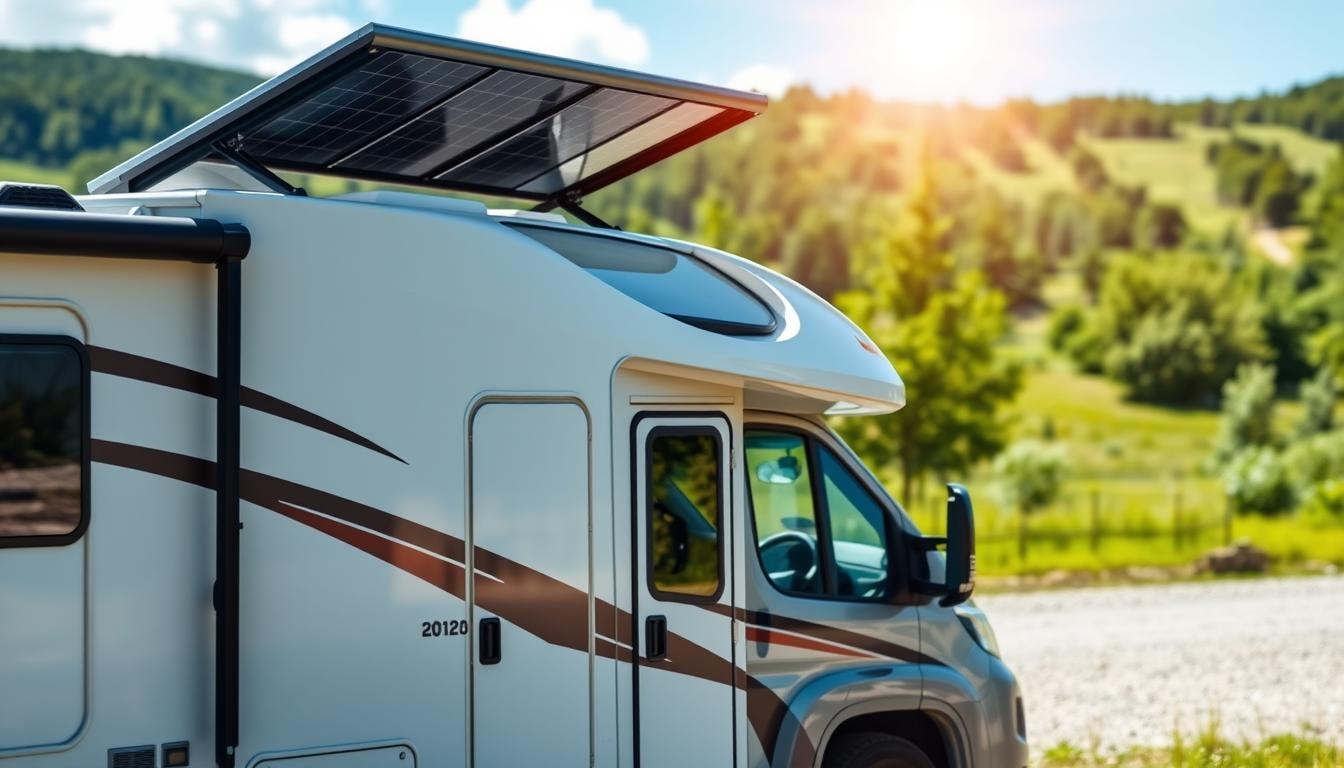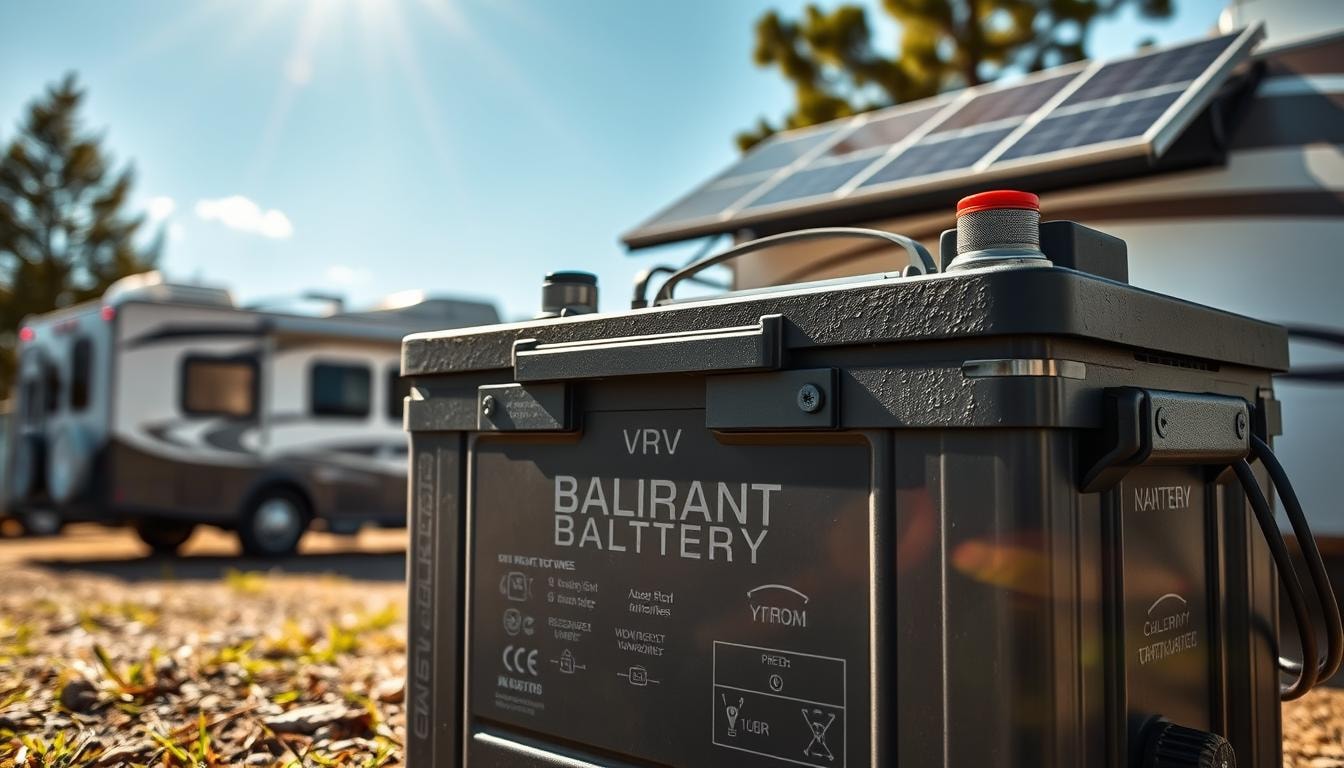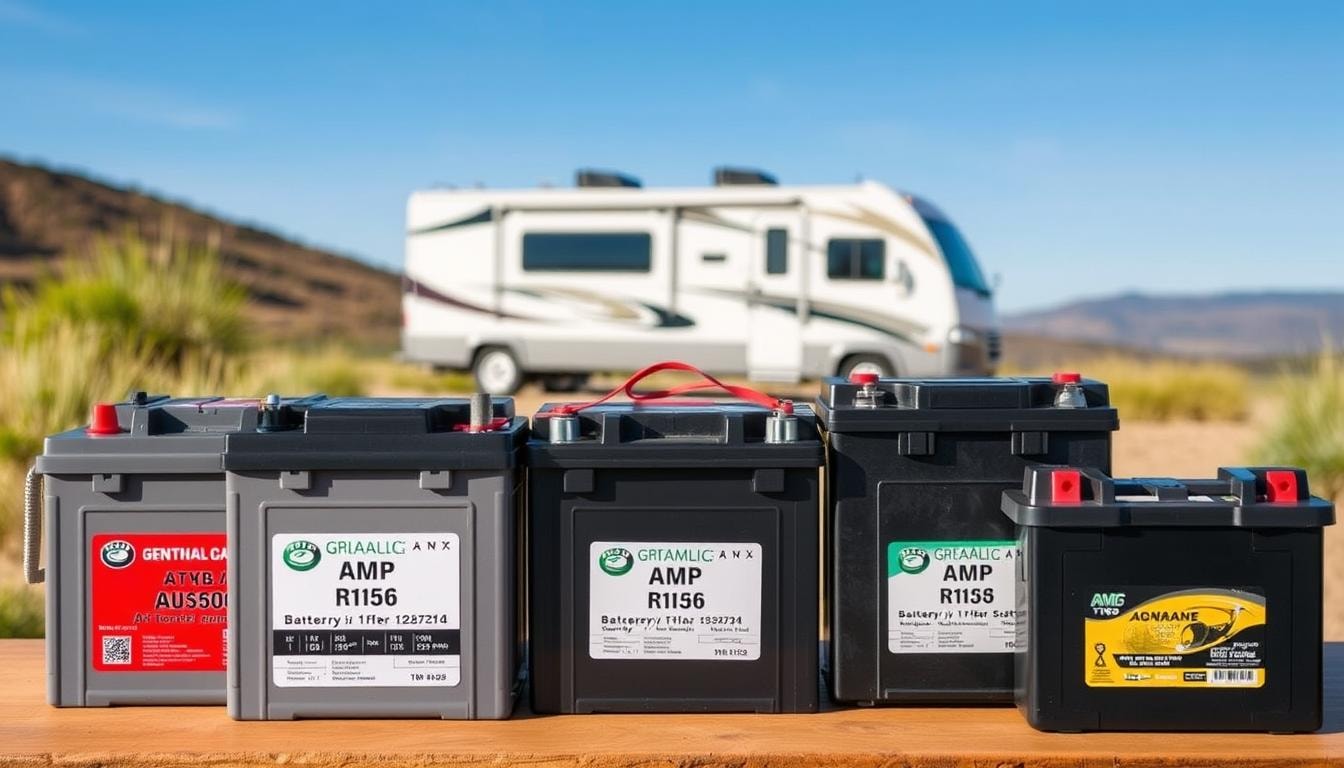Physical Address
304 North Cardinal St.
Dorchester Center, MA 02124
Physical Address
304 North Cardinal St.
Dorchester Center, MA 02124
As an RV owner, choosing the right solar battery is key to off-grid adventures. With so many options, finding the right battery for your RV’s needs can be overwhelming. This guide will help you know what to look for, the types of RV batteries, and how to size your battery bank for off-grid living. A solar battery is a critical part of your overall solar system for your RV, storing energy from your solar panels and giving you a power source when the sun isn’t shining. Solar batteries are also great for off-grid applications like RVs, boats, and camping, so you can roam without sacrificing power for your journey.
By the end, you’ll know how to pick the perfect solar battery. This will ensure your RV runs smoothly on the road.

Standard car batteries can’t power an RV. RVs have many 12V electrical parts, like lights and water pumps. These parts need a special battery that can handle heavy use.
Car batteries aren’t made for RVs’ constant power needs. RV “house” batteries are built for long-lasting power. They’re key for your RV’s rv battery, rv electrical system, and rv battery requirements.
RV batteries must power many appliances, unlike car batteries. They need to give steady power for a long time, even without shore power. Choosing the right RV battery is vital for your RV’s comfort and function.
“RVs require a special type of battery compared to a standard automobile battery. RVs are equipped with numerous 12V electrical components, from lighting and appliances to water pumps and slide-outs. A standard car battery is not designed to handle the deep cycling and heavy load demands of an RV’s electrical system.”
Choosing the right RV battery involves looking at several important factors. These include the amp-hour (AH) rating, required maintenance, and expected lifespan. Each of these plays a big role in finding the best battery for you.
The amp-hour (AH) rating shows how much energy a battery can store, indicating how much power it can hold. A higher rating means your RV’s 12V devices and appliances can run longer. This is especially important for those who like to camp off-grid or dry camp a lot.
Some batteries, like flooded lead-acid, need regular checks and water to work well. On the other hand, lithium-ion batteries are easy to care for and don’t need much maintenance. This makes them a convenient choice for many.
The lifespan of an RV battery varies by type. The number of discharge cycles significantly impacts the lifespan of lithium batteries compared to lead-acid batteries. Lithium-ion batteries can last 10 years or more, while lead-acid batteries might only last 2-3 years with heavy use. Knowing how long a battery will last helps you decide if it’s worth the investment.
The price of an RV battery is also a big consideration. Lithium-ion batteries might cost more upfront, but they last longer and need less care. This makes them a better value over time. It’s important to balance the rv battery cost with other factors to find the best fit for your budget and needs.
By looking at these key factors, you can pick the RV battery that fits your power needs, maintenance habits, and budget. This ensures your RV has a reliable and efficient power source. It will make your off-grid adventures and camping trips even better.
Flooded lead-acid batteries are the most common and affordable choice for RVs. They have a liquid inside that needs to be checked and topped up. They are cheap at first but don’t last as long as others, lasting about 3 to 5 years.
They also need more care and can release harmful fumes. This means you need to make sure they are well-ventilated.
While they are a budget-friendly option, their short life and need for more upkeep are big downsides. They might need to be replaced more often than other types, with an average of 200-750 charge cycles.
| Battery Type | Average Lifespan | Charge Cycles | Maintenance | Cost |
|---|---|---|---|---|
| Flooded Lead-Acid | 3 to 5 years | 200-750 | High | $ |
| AGM | 6 to 10 years | 300-1000 | Moderate | $$ |
| Lithium-Ion | 10 to 15 years | 1000-4000 | Low | $$$ |
Choosing the right lead acid rv batteries for your RV is key. It’s important to consider the pros and cons of each type. This way, you can pick the best one for your needs and budget.
AGM (Absorbent Glass Mat) batteries outperform traditional flooded lead-acid batteries. They have an electrolyte in a fiberglass mat, not liquid. This design makes them easy to use and eliminates the need for venting.
AGM batteries can handle extreme temperatures and last up to 500 cycles. This is much longer than standard lead-acid batteries. But, they cost more at first.
AGM batteries are great for RV owners because they can absorb more current and recharge quickly. They can be fully recharged in 2 to 8 hours. This makes them perfect for frequent use in RVs. They also have higher amp-hour (Ah) ratings, giving more power for your RV’s needs.
| Feature | Flooded Lead-Acid | AGM |
|---|---|---|
| Maintenance | Requires regular water checks and refilling | Maintenance-free |
| Lifespan | 300-500 cycles | 500+ cycles |
| Charge Time | 8-16 hours | 2-8 hours |
| Cost | Lower initial cost | Higher initial cost |
When charging agm rv batteries, use a charger made for AGM technology. Regular chargers might not give the right voltage and current. This could damage the AGM battery. Many makers, like Interstate Batteries, have smart chargers for AGM batteries. These chargers safely charge in multiple stages.
The advantages of agm batteries for rv owners include their easy use, long life, and quick recharge. The higher initial cost is worth it for reliable power in RVs.
Gel cell batteries use a silica-based gel instead of liquid as the electrolyte. They are similar to absorbent glass mat (AGM) batteries in being sealed and needing no maintenance. Gel batteries can handle up to 1,000 cycles, sitting between lead-acid and lithium in cost and performance.
One big advantage of gel cell batteries for RV use is they can be installed in any position without leaking. This is great for RVs’ tight spaces. Also, gel batteries don’t need regular water checks, which is a big plus for RV owners.
Gel batteries cost more than flooded lead-acid but offer many benefits. Their sealed design, long life, and flexibility in installation make them a top choice for RV trips. They are reliable and easy to use for off-grid adventures.
Gel cell battery chargers and maintainers vary in price. For example, the Battery Tender Junior 12v 750 mA Smart Battery Charger & Maintainer is $39.95. The OptiMATE 3 12v 0.8 Amp 7-Step Battery Saving Charger-Tester-Maintainer is $74.95. The right choice depends on the RV owner’s needs and budget.
Lithium (LiFePO4) batteries are becoming the top choice for RV power. They offer many benefits over traditional lead-acid batteries. This makes them a great investment for your lithium rv batteries.
Lithium batteries last much longer than lead-acid ones. They can go through 3,000 to 5,000 cycles. This is way more than the 500 to 800 cycles of lead-acid batteries. This means they can power your RV for years, giving you reliable performance.
Lithium batteries need no maintenance. You don’t have to water or vent them like lead-acid batteries. This saves you time and lets you enjoy your travels more.
Lithium batteries are much lighter than lead-acid ones. They are about one-third the weight. This can make your RV more fuel-efficient and carry more stuff, improving your RV experience.
Lithium batteries charge up quickly. This means you can hit the road faster after a stop. It’s great for boondocking or using solar power. Additionally, lithium batteries can achieve maximum power quickly, enhancing their efficiency.
Lithium batteries work well in hot and cold weather. They keep your power on, even when it’s tough outside.
Lithium batteries cost more upfront, but they save money in the long run. They last longer, need less care, and perform better. Investing in lithium rv batteries can make your RV trips better. It gives you the power you need for off-grid adventures.
Lithium batteries for RVs mainly use two types: Lithium Nickel Cobalt Aluminum Oxides (NCA) and Lithium Iron Phosphate (LiFePO4). NCA batteries, like those in Tesla cars, have more energy. But LiFePO4 is better for RVs because it’s safer and lasts longer. Compared to other lithium batteries, LiFePO4 batteries offer superior safety and longevity, making them an excellent choice for RV applications.
LiFePO4 batteries are known for being very safe and lasting a long time. They can handle tough conditions and are less likely to catch fire. They also last up to 8,000 charges, much longer than old batteries.
NCA batteries pack more energy but are not as stable as LiFePO4. They’re used in electric cars but are rare in RVs because of safety issues. RVs need stronger batteries and better management systems.
Top makers of RV lithium batteries include Battle Born, Relion, and Trojan. They use cells from China and make them in the U.S. They offer lifepo4 lithium batteries and nca lithium batteries designed for RVs.
| Manufacturer | Battery Model | Capacity | Voltage | Price |
|---|---|---|---|---|
| Battle Born | BBGC2 LiFePO4 | 100Ah | 12V | $799 |
| Relion | RB100 LiFePO4 | 100Ah | 12V | $749 |
| Trojan | T-145 LiFePO4 | 145Ah | 12V | $899 |
As lithium battery manufacturers for rv keep improving, RV owners will see better and cheaper batteries soon.
If you love RVs, switching to lithium-ion batteries is a big step up. They beat traditional batteries in many ways, making them a great choice for RV fans. The rapid growth and adoption of lithium batteries in the RV battery market highlight their increasing popularity and advantages.
Lithium batteries are much lighter, up to 60% less than lead-acid ones. This means you can carry more stuff or get better gas mileage. It also improves how your RV handles and performs.
Another cool thing about lithium batteries is how long they last. They keep their charge longer than lead-acid ones, giving you more power for your devices. This is super helpful when you’re boondocking or living off the grid.
Plus, lithium batteries last a long time, up to 5,000 cycles. That’s 3-5 times longer than lead-acid ones. So, upgrading rv to lithium batteries is a smart move for the long haul.
Yes, lithium batteries cost more upfront. But they need less maintenance and last longer. With the benefits of lithium rv batteries, you get a reliable and efficient electrical system. This lets you enjoy your RV trips even more.
| Feature | Lead-Acid Batteries | Lithium Batteries |
|---|---|---|
| Voltage | 12 volts | 12.8 volts |
| Lifespan | 300-500 cycles | 3,000-5,000 cycles |
| Charging Requirements | Equalization and “return to bulk” voltage settings | Dedicated lithium charger with CV/CC algorithm |
| Weight | Heavier | Up to 60% lighter |
| Cost | Lower initial investment | Higher initial investment |
When you switch to lithium batteries, make sure to use a special charger. Using a regular charger can damage them and might void the warranty.
In summary, upgrading rv to lithium batteries is a smart choice. It brings many benefits of lithium rv batteries that make your RV trips and off-grid living better.
Choosing the right battery size is key for boondocking or off-grid living. There are two main ways to size your batteries: the conservative and liberal approaches.
The conservative method uses a bigger battery bank, usually 300-600 amp-hours (Ah). This size ensures you have enough power for long periods without enough solar charging. It’s more expensive and heavier, but it gives you peace of mind and longer battery life.
The liberal method uses a smaller battery bank, about 100-200 Ah. This is cheaper and works well if you have strong solar panel charging. It depends on your solar panels to keep the batteries full, and it might not last as long without solar.
Finding the right battery size for your RV depends on your power needs, solar setup, and how you plan to use it. Many RV owners choose a middle option that balances cost, weight, and battery life. This ensures they have enough power for their off-grid needs.
| Approach | Battery Bank Size | Pros | Cons |
|---|---|---|---|
| Conservative | 300-600 Ah | * Ample capacity for extended off-grid use * Provides peace of mind | * Higher upfront cost * Increased weight |
| Liberal | 100-200 Ah | * Lower cost * Suitable if solar charging is reliable | * Limited runtime during extended off-grid stays * Reliance on consistent solar charging |
Think about your power needs, solar setup, and off-grid goals to find the best rv battery sizing for boondocking or off grid rv battery bank sizing for your RV.
Choosing the right battery for your RV is key. It affects how well your RV runs, how long it lasts, and how reliable it is. Here are some top brands for RV batteries:
Including a wiring kit in complete solar power systems for RVs is essential for efficiently connecting solar panels to batteries and enhancing the overall functionality of off-grid systems.
When picking an RV battery, look into the manufacturer’s reputation, warranty, and what other customers say. This ensures you get a battery that’s reliable and lasts long for your travels.
| Battery Brand | Battery Type | Cycle Life | Warranty |
|---|---|---|---|
| Lifeline | AGM | 300-4,000 cycles | 2-5 years |
| Trojan | Flooded, AGM | 200-750 cycles | 1-2 years |
| Relion | LiFePO4 | 2,000-5,000 cycles | 5-10 years |
| Battle Born | LiFePO4 | 3,000-5,000 cycles | 10 years |
| Deka/East Penn | Lead-Acid | 200-750 cycles | 1 year |
When choosing the best RV battery brands, think about cycle life, warranty, and performance. This ensures your power needs are met well and at a good price.
Choosing the right solar battery for your RV is important. You need to think about capacity, maintenance, lifespan, and cost. Lead-acid batteries are affordable but lithium-ion batteries offer more benefits.
Lithium-ion batteries last longer, are lighter, and need less care. They are great for RV owners who love off-grid adventures and want to save money in the long run.
Knowing the good and bad of each battery type helps you make the best choice. This ensures your RV has the power it needs for your adventures. Whether you’re choosing an rv solar battery, looking for rv battery selection tips, or figuring out how to pick the best rv battery, research is key.
With the right battery, you can enjoy the freedom of solar power. It lets you power your adventures with clean energy. Investing in quality solar panels and keeping your battery well-maintained saves money and improves your camping trips.
Important factors include the amp-hour (AH) rating, maintenance needs, lifespan, and cost.
Main types are flooded lead-acid, AGM (Absorbent Glass Mat), gel cell, and lithium (LiFePO4).
Lithium batteries last 3,000-5,000 cycles, need no maintenance, are light, and charge fast.
RVs use NCA (Lithium Nickel Cobalt Aluminum Oxides) and LiFePO4 (Lithium Iron Phosphate). LiFePO4 is safer.
Choose a 300-600Ah battery bank for safety or a 100-200Ah bank if you have enough solar power.
Top brands include Lifeline, Trojan, Relion, Battle Born, and Deka/East Penn.